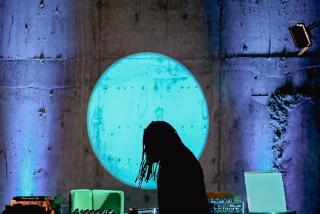Turning Down the Racket : Hearing: Loud music can damage the ears. So, while the search is on for tinnitus and hyperacusis cures, the focus is on prevention.
- Share via
Elizabeth Meyer knew something was wrong when she returned from an African-music concert in Seattle and noticed a slight ringing in her ears.
“It got worse over several weeks,” she says. “I noticed sounds were slightly distorted, as though there were reverberations in my head.”
When the Portland, Ore., resident went for a hearing test, doctors told her that she was suffering from tinnitus--a maddening, persistent noise emanating from within her head--and hyperacusis, a painful sensitivity to sound.
“It got so bad it sounded like the highest sound (that) truck brakes make,” she says. “I had to physically restrain myself from jumping up and smashing my head against the wall for the first year.”
Unable to banish the tinnitus, which she hears as a continual thin, screechy noise, Meyer grew despondent, and that only made things worse. “I couldn’t cry, because the sound of my own sobbing hurt my ears,” she says.
Each year, thousands of people suffer some degree of hearing impairment from listening to loud music. Although most learn to live with it, for others it is a debilitating, life-altering experience.
There are many sources of exposure: over-amplified music at live concerts, the bone-shaking thump of speaker-packed “boom cars” and lightweight portable tape-player headphones.
But even as veteran rockers such as Pete Townshend join the chorus of doctors and scientists warning of too much volume, pleas to turn it down still mostly fall on deaf ears among those who live by the slogan, “If it’s too loud, you’re too old.”
Occupational Safety and Health Administration guidelines say a person can safely withstand continuous noise of 90 decibels for eight hours, 100 decibels for two hours and 110 decibels for half an hour. But a rock concert, which may last more than two hours, can exceed 120 decibels, and stereo headphones can produce 115 decibels.
Dr. John House, an otologist with the House Ear Clinic and president of the nonprofit House Ear Institute in Los Angeles, says 80% of his patients with a hearing loss also have tinnitus, which may sound like continuous ringing, buzzing or hissing.
While many people suffer on-the-job hearing loss, among younger patients music is the most likely culprit, he says.
“It’s mostly live music, and it’s mostly concerts,” House says. “I would say 10% of people who are regularly involved with music do suffer some hearing loss or tinnitus.”
Hyperacusis, which is much less common, results mostly from rock concerts, he says. Sufferers “really become miserable because they can’t go out in public.”
The first sign of damaged hearing is ringing and a muffled sensation, known as temporary threshold shift. This usually lasts a few hours to a few days, then subsides. Young concert-goers often ignore such warnings. “The problem is, every time they’re doing that, they’re doing some damage,” House says.
As hearing loss progresses, people have a hard time hearing certain frequencies, making it difficult to understand conversation amid background noise, for example.
James Kelly, a hearing researcher at the University of New Mexico, says loud noises damage the delicate mechanism of the inner ear.
Sound waves are transmitted through the fluid-filled cochlea, which is lined with microscopic hair cells, each “tuned” to pick up a specific frequency.
“Hair cells are delicate,” Kelly says. “They’re sensitive to motions that are less than the diameter of a hydrogen atom.”
When exposed to a loud sound, some hair cells are flayed and laid flat, Kelly says. Nerve fibers at the end of each hair cell also swell tremendously, he says. Tinnitus seems to arise in the irritated nerve cells, he adds.
Doctors can’t do much to alleviate tinnitus, although they may prescribe steroids to reduce inner-ear swelling and anti-depressants or anti-anxiety drugs for those who suffer emotionally from the incessant noise.
Scientists meanwhile are studying the ears of birds, which apparently can regenerate inner-ear hair cells, to see if people can be helped, Kelly says.
With no cure for tinnitus and hyperacusis, the primary focus is on prevention, says Charlie Lahaie, director of public relations and community outreach at the House Ear Institute.
“It’s real hard to get across to kids, ‘You’re going to have a hearing loss,’ ” she says. “Of course, when you’re a teen-ager, nothing’s going to hurt you.”
Several years ago, the institute joined with Mix Magazine and a group of music professionals to launch the HIP (Hearing Is Priceless) campaign, which produces educational videos and distributes ear plugs.
HIP advisory board member Nathan East, a bass player who has toured and recorded with Eric Clapton, has used custom-molded musicians’ earplugs since becoming concerned about ringing in his ears.
Unlike conventional foam earplugs, which muffle high-frequency sounds in particular, the musicians’ model reduces all frequencies about equally, so music still sounds the way it’s supposed to, he says.
East says he was relieved to find he hadn’t suffered much hearing loss despite his years of touring.
“You have one set of eardrums, and if you blow them out, that’s all she wrote,” he says. “It’s all about preventive maintenance.”
Although East’s ears are protected, he’s concerned about concert-goers who line the stage close to the speakers.
“I worry, especially when I see people with their babies out there,” he says.
But as Elizabeth Meyer discovered, hearing damage doesn’t always require years of repeated exposure to loud sounds.
Most people suffer a gradual decline in their hearing, but Meyer’s symptoms intensified within weeks of the Seattle concert.
Doctors say some people are unusually sensitive to loud noise, although it’s impossible to predict which people.
“I’ve heard the phrase ‘tough ears and tender ears,’ and you never know which ones you have,” Meyer says.
Ironically, her hearing loss, which began four years ago, grew out of a passion for playing the African marimba, a percussion instrument.
“I practiced so vigorously I suffered severe tendinitis in both arms,” she recalls. Deciding to give her body a rest, she started attending African-music concerts. Soon after, Meyer, 36, found that most ordinary sounds caused her pain.
“Everything sounded nightmarishly amplified,” she says. She couldn’t listen to television or radio and had to put a pillow over the telephone for the few minutes of conversation she could bear.
She tried desensitizing herself to the symptoms using a masking device that generates white noise. Although that helped somewhat, Meyer still wears foam earplugs or molded custom earplugs, together with industrial-strength acoustical earmuffs before venturing outside.
They enable Meyer--a German teacher, artist and poet--to at least ride the bus, although, she says, “I still have to really ration my traveling.”
The measures Meyer must take to cope with her hearing loss affect virtually every facet of her life.
“It really gets in the way of dating situations,” she says, “because the normal kinds of things people do together, I can’t do.”
Still, she’s moved far beyond the stage of feeling suicidal about her plight. She now serves as an educator and resource person for others experiencing a hearing loss.
“I’m doing a lot better,” she says. “I tell myself sometimes, ‘When things get really bad, they get better, and if they don’t get better, I’ll develop better coping skills.’ ”
Where to Turn
For more information on hearing loss and tinnitus, contact:
HIP Campaign (Hearing Is Priceless)
House Ear Institute
2100 W. 3rd St.
5th Floor
Los Angeles, Calif. 90067
(213) 483-4431
American Tinnitus Assn.
Box 5
Portland, Ore. 97207
(503) 248-9985
HEAR (Hearing Education and Awareness for Rockers)
Kathy Peck-Denny, Director
Box 460947
San Francisco, Calif. 94146
(415) 773-9590
More to Read
Sign up for Essential California
The most important California stories and recommendations in your inbox every morning.
You may occasionally receive promotional content from the Los Angeles Times.













